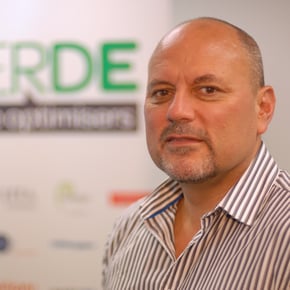If you're into business, you've probably heard of ERP but you're not alone in not knowing what it actually is.
Here’s what ERP actually is, where the term comes from, and what it can do for your business.
You may have heard someone talking about ERP software transforming their business or helping them streamline their processes. But you may still be confused about what it actually is (or does).
At Verde, we think it’s important that people understand what they’re getting into before they choose ERP software. Confusing lingo and buzzwords don’t help anyone, so we make it our mission to make it as clear and easy to understand as possible.
Here’s what ERP actually is, where the term comes from, and what it can do for your business.
The what: What does ERP actually mean?
ERP stands for Enterprise Resource Planning. But that doesn’t really tell you anything about what it does. In short, ERP is business management software that lets your business integrate applications and automate business functions.
Typically a suite of integrated applications, ERP can be used to collect, store, manage and interpret data from different parts of your business, including operations, planning, development, HR, payroll, accounts, and even sales and marketing.
It gives an integrated view of core business processes, often in real-time, facilitating information flow between the various departments of a business. Because every business is different, ERP software can be customised, with a range of application to suit your needs and processes.
It’s all aimed at helping your business do what it does, better.
The when: A brief history of ERP
The acronym ERP was first used in the distant past - wait, we mean in the 1990s. It was seen as an extension of existing Material Requirements Planning (MRP) software. ERP eventually became an umbrella term for application integration beyond the manufacturing sector.
ERP experienced rapid growth in the 1990s, moving beyond manufacturing to be used in all types of business, including not-for-profits and government organisations. Faced with potential software issues at the millennium, many companies chose to replace old systems with ERP just before the year 2000.
Later, as more companies began to take advantage of web-based systems and mobile technology, ERP adapted to fit. The term ‘ERP ll’ describes ERP software that can be accessed through the web or mobile devices.
The how: How does ERP software work?
All ERP software is not created equal, but most systems do share some commonalities. The one feature all ERP systems include is a shared database used by different business units. This common database allows different people across the business - whether in sales, accounting, HR or anywhere else - to access to the same information when making business decisions.
Increasingly, ERP software also offers automated reporting, giving businesses accurate information in real-time. This makes it easier to plan for the future and make good business decisions. Newer systems, like Greentree4, include a user-friendly portal or dashboard where employees can access instantly information about key performance metrics.
But it’s not just about data - ERP also allows companies to automate processes and streamline functions, taking some of the boring, repetitive grunt work from employees. This is a positive for obvious reasons - it gives staff more time to do work that actually grows the business, and decreases the chance of human error. It’s about giving people the tools to do their jobs as quickly and effectively as possible.
The why: Is ERP right for your business?
Greentree CEO, Peter Dickinson, clearly articulates why ERP software is a critical business tool in this video. It has been changing the face of businesses large and small for over 25 years. As it continues to change and adapt - with mobile functionality and cloud-based data - it continues to be a valuable tool for companies and not-for-profit organisations all over the world.
Whatever your business does, the right ERP system can transform the way you do it. Use it or not, at least you can now use the term “ERP” confidently with full knowledge of what it means.

